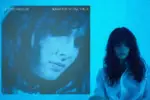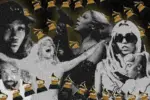Eighteen-year-old singer-songwriter Ruel, full name Ruel Vincent van Dijk, has released his first song since his last EP. Written by Ruel and Peter James Harding and produced by M-Phazes, “too many feelings” has a strong pop sound.
Ruel’s lyricism and traditional pop tone give way to the future of new pop. Pop artists like Ruel, Dua Lipa and Shawn Mendes are adopting sounds from pop artists of the past. While Dua Lipa’s “Future Nostalgia” contains hints of Madonna, Ruel’s “too many feelings” gives a slight nod to Elton John.
Ruel is originally from London but grew up in Australia, and the artist has been on the radar of popular music since he was 14. He is best known for his songs “As Long As You Care,” “Painkiller” and “Dazed & Confused.”
Ruel’s latest song, “too many feelings,” was released on Feb. 11, 2021. The song starts as a piano ballad, almost paying homage to old school pop such as Billy Joel classics. Once the refrain starts, a synth-pop beat and a drumline begin.
The first verse starts with the lyrics, “Try to tell you I don’t care / As long as we can still be friends / I know I wasn’t thinking, if I had’ve listened / To the other voice inside my head / You wouldn’t be gone / You left my light on (Ooh).” This verse, and the song itself, demonstrates how honesty ultimately led to the end of a relationship.
The refrain repeats with sweeping harmonies and choral backgrounds that speak to classic pop inspirations like Madonna and the Beatles. Ruel’s lyrics emphasize his talent with the words, “You’re doing fine, I’m not coping / If there was something, it’s broken / I had enough, but I lost it all.”
The bridge begins with the same piano melody and pop background, but listeners can hear a clear guitar line this time. Although the guitar is upbeat, the lonely string theme sounds hollow and haunted with lyrics that speak of a broken heart and a longing for a past love.
The guitar leads into the refrain, leaving the synth-pop beat behind to create intimacy with the audience through a clear piano melody and Ruel’s reticent vocals. The refrain ends with an intermission of silence that sets off a remission of the pop beat, as well as notes of triangle and tambourine in the second chorus.
The second chorus is the final part of the song, and its buoyant sound is in complete juxtaposition to the lyrics. The whole song is an upbeat pop hit while also being a remorseful poem about what should have been left unsaid.
This newest hit is one of many since Ruel got his start in music as an adolescent. In 2015, Ruel’s father sent a demo of him singing James Bay’s “Let It Go” to the producer M-Phazes, who had previously won a Grammy for his work with Eminem. By 2017, Ruel released his debut single, “Golden Years,” which was produced by M-Phazes.
In September 2017, Elton John played Ruel’s “Don’t Tell Me” on BBC Radio 1, and later that year, Ruel joined Khalid on his American Teen Tour of Australia and New Zealand. By the end of November, Ruel signed with RCA Records internationally.
Ruel released his extended play “Ready” in 2018, and his single from that EP, “Younger,” was certified gold by ARIA, the Australian Recording Industry Association. In September 2019, Ruel released his second EP, “Free Time,” with the hits “Face to Face” and “Painkiller.” In October 2020, Ruel released his most recent EP, “Bright Lights, Red Eyes.”
Elton John recognized Ruel’s talent in 2017, but he was also drawn to Ruel’s music because it followed a traditional pop prototype, which isn’t a bad thing. As language and technology begin to evolve, so do industries. This can be seen in the mid-2010s when there was a clear emphasis on synthesized background music in pop songs, like that of Taylor Swift’s album “1989.”
Now, the pop genre seems to be experiencing a shift from art pop to the more traditional piano melodies found in Beach Boy hits and Stevie Wonder sensations. This indicates not just a shift, but a reverence for sounds of the past, while also demonstrating how music begets music in all periods and genres.
Ruel’s “too many feelings” is a prime example of how vintage pop is making its way back into the mainstream. The song reminds listeners that music of the past is never really past, and it illustrates not just Ruel’s present career, but also pop music’s future.

















